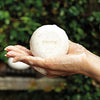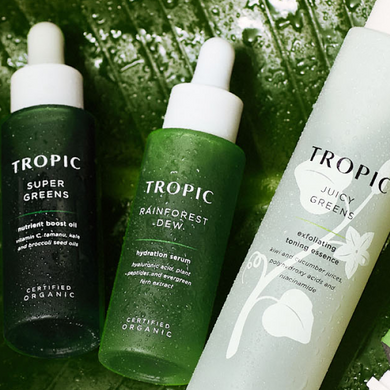It’s the little things you do that can ease the weight of the world’s waste. Tread the earth a little lighter with these top tips for going greener.
Phillipa, previously Editor of both Be Kind and Vegan Life magazines, has spread her sustainable wings and flown into freelance journalism with a focus on all things ethical and green.

Be thoughtful about fashion
We’re all aware of the perils of fast fashion, and as tempting as those bargains can seem, the impact of impulse purchases is significant. From the labour behind the label to water waste, microfibre pollution and its huge carbon footprint, it’s time to ditch fast fashion and start shopping smarter. Second-hand clothing is a wonderful way to indulge in some retail therapy while being a little more sustainable – as well as saving the energy used to create a new product, you can find yourself one-off pieces that have been built to look great and last. If you don’t fancy trawling the shops, then Oxfam, Vinted and ASOS Marketplace are great places to explore online. Also, when you’re having a closet clear out of your own, remember to take your pre-loved items to charity shops and clothes banks or consider selling them on. The best philosophy to have, however, when being thoughtful about fashion, is ‘don’t buy what you don’t need’ – remember that choosing to buy affordable pre-worn items rather than having to is a privilege. As charity shops begin to gentrify due to a shift in demand for secondhand, we all need a tenacious grip on our purchasing power, using it mindfully to buy more expensive, slow fashion garments where we can afford to so that charity shops can remain accessible. Remember that sustainability isn’t a trend – marginalised and underprivileged communities have been making do with only what they need for centuries.
Reuse and refill

As consumers, we throw away an incredible amount of rubbish every year, contributing to a plethora of issues for our beloved planet. Instead of adding another piece of trash to the world’s problematic landfill pile, why not consider refilling? There are many ways to do this and a great place to start is by finding your local zero-waste store. Here, you can fill up your old washing up liquid bottles or take your empty Tupperware to stock up on items such as flour, lentils, rice, cereals and spices. Did you know you can refill many of your favourite Tropic products, too, from their award-winning Elixir through to their Pillow Mist? Another great way to help cut back on waste is by creating a natural custom makeup palette with your favourite Tropic beauty items – when something runs out, instead of buying a brand new compact, you can simply replace it with a new pan instead. Head to Tropic’s website to find out more.
Our bath foam refill pouches use 87% less plastic than the original bottle and are 100% recyclable with our return 5, get 1 free initiative.
If everyone chose the refill option for any of Tropic’s facial serums and oils when re-ordering, we could save an extra 2 tonnes of waste from being disposed of every year.
Cut back on your food waste
We’re all guilty of wasting food - when last night’s leftovers aren’t perhaps sounding as tempting as a Friday night treat, it’s easy to lose sight of the bigger picture and let our appetites take over. The reality is we throw away a staggering amount of food – the equivalent of one in every five bags of shopping we buy and 7 million tonnes of food is wasted in UK households every single year (lovefoodhatewaste.com). Planning your meals in advance is a simple way to stay on track and to be more accountable for what you spend, and what you bin – create a weekly meal chart and only buy what you need for those recipes. Keep an eye on sell-by dates and move any items that are due to perish to the front of the fridge, so you’re prompted to use them first. Also, remember there are so many fresh foods you can freeze and use on another day, like bread, herbs, soups and curries.
Choose ethical brands
When it comes to purchasing, the pounds in your purse hold a lot of power. While shopping, choose brands whose ethics you align with and who are clear on the part they are playing in being more sustainable. Large corporations often carry big carbon footprints, so it’s worth finding out what your go-to companies are doing to offset this. For example, Tropic is a certified CarbonNeutral company – all of our carbon emissions are accounted for and double offset. Showing your support for brands that give back is an easy way to make a big difference – look out for logos on packaging that assure you a company is doing their bit for the environment and do your research on their certifications before you buy. Take time to find out where and how your clothes are made too – check out Good On You (goodonyou.eco) for a list of ethical brands and to see how your current favourites fare, too.
Save on precious resources

We are so lucky to have access to clean, running water at the turn of a tap and electricity at the flick of a switch. But, all too often we take these luxuries for granted, and collectively our consumption puts a big strain on the planet. There are a multitude of ways to be more sustainable in your home – watching your water usage is a great place to start. The average 8-minute shower uses 62 litres of water (Unilever) – next time you take one, try sticking to a time limit of 5 minutes, and encourage your family to do the same. Turning off the faucets while you lather up will cut your water usage right back, too, and don’t keep the flow running while you brush your teeth or wipe down any surfaces. Also, simply remembering to turn off appliances at the wall and always switching off lights when you leave the room can make a big difference.
In response to fears of global water scarcity, Tropic’s Clear Skies Cleansing Powder and Clear Slate Deep Cleansing Powder are all waterless products, in both the manufacturing process and their carefully considered formulations.
Take lessons from the past
We have much to learn from previous generations, when resources were less abundant and living sustainably was second nature. We don’t need to look back far either – it wasn’t long ago that being frugal and repurposing items was a way of life; it’s only in our modern, ‘throw-away’ society that often we don’t stop to consider how to make do and mend the things we already own. Next time you’re considering a new purchase, look carefully at the items you already have. Could your shoes last a little longer with a clean and a simple re-heeling? Could those old jeans see a new lease of life as shorts? For the things you can’t fix, such as electrical appliances, consider getting a professional to take a look before you buy brand new.

 Skincare
Skincare
 Gifts
Gifts
 Men's
Men's
 Bestsellers
Bestsellers
 Body Care
Body Care
 Sun Care
Sun Care
 Makeup
Makeup
 Mama & Baby
Mama & Baby
 Hair Care
Hair Care

